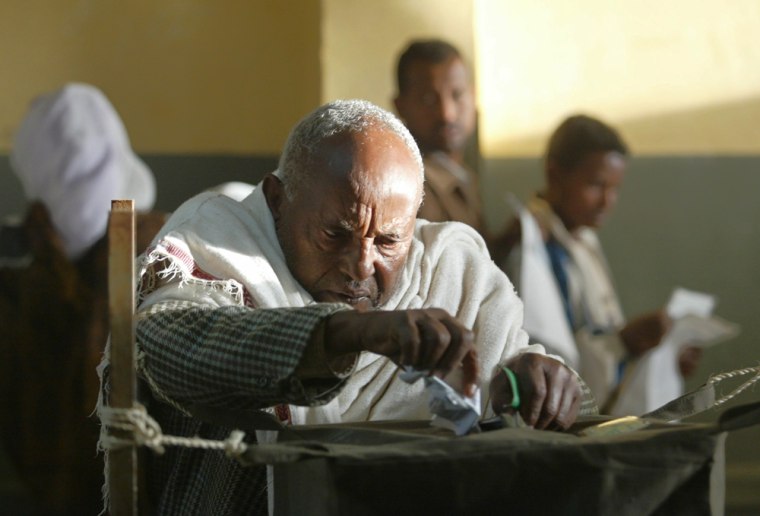Early returns on Monday showed the opposition doing well in the capital after 90 percent of voters turned out for a parliamentary election seen as a test of Ethiopian leaders’ commitment to democracy.
The ruling coalition that ended an oppressive dictatorship in 1991 is expected to move ahead once results come in from rural areas, where most of Ethiopia’s 70 million people live.
But the main opposition — which had gone into Sunday’s vote with only three representatives in the 547-seat parliament — was expected to do better than expected even in the countryside.
Leaders of the main opposition Coalition for Unity and Democracy claimed that by their own count, they had won at least 185 seats across the country, including all 23 seats in the capital.
Nationwide provisional results are expected on Saturday and final results will be announced June 8.
Complaints of irregularity decrease
As the count proceeded, opposition politicians were toning down earlier complaints of irregularities and sweeping threats to reject the results. The threats had led the prime minister to ban demonstrations and put the capital’s police under his direct command.
At a news conference Monday, Berhanu Nega, vice chairman of the Coalition for Unity and Democracy, said it was too early to decide whether to accept the results, though he said reports of wide abuses continued to come in.
International observers — allowed to monitor voting here for the first time — did not back the opposition’s accusations of widespread problems.
Former President Jimmy Carter, who led 24 teams of observers from his human rights and development center, said that while there were minor problems in the run-up to the vote, the elections on Sunday were “as good as any we’ve seen.”
Carter hails move ‘toward democracy’
“Great progress was made toward democracy,” said Carter, praising the government’s decision to hold regular political debates and granting the opposition free radio and television time, but said there were isolated cases of unlawful arrests and harassment. He said the Carter Center would issue a final report after the official results are released next month.
More than 500 foreign observers, including European Union teams, monitored the polls.
Hailu Shawel, the leader of the Coalition for Unity and Democracy, scoffed at the observers for their upbeat assessment, calling them “a joke” and saying they had failed to do their duty. But the large turnout indicated most Ethiopians embraced the process as largely free and fair.
Kemal Bedri, chairman of the National Electoral Board, said 90 percent of the more than 25 million who had registered voted. Polling stations were overwhelmed. Those still in line after polls officially closed at 6 p.m. Sunday were allowed to vote, and polling in Addis Ababa lasted until 5 a.m. Monday.
Zenawi’s commitment to change at stake
Prime Minister Meles Zenawi, known as one of the continent’s more progressive leaders, has pledged his sometimes authoritarian government would introduce greater democracy. Many had pointed to Sunday’s race as a test of his commitment to reform.
In the last vote in 2000 — seen as less democratic and drawing a markedly lower turnout than on Sunday — the ruling coalition took 534 of 547 seats in the lower house of parliament.
Ethiopia was an absolute monarchy under Emperor Haile Selassie until the mid-1970s, when a brutal Marxist junta overthrew him.
Civil wars wracked the ethnically fractured country in the 1980s, and famine took as many as 1 million lives. Meles’ rebel group overthrew the junta in 1991. Meles became president, then prime minister in 1995.
